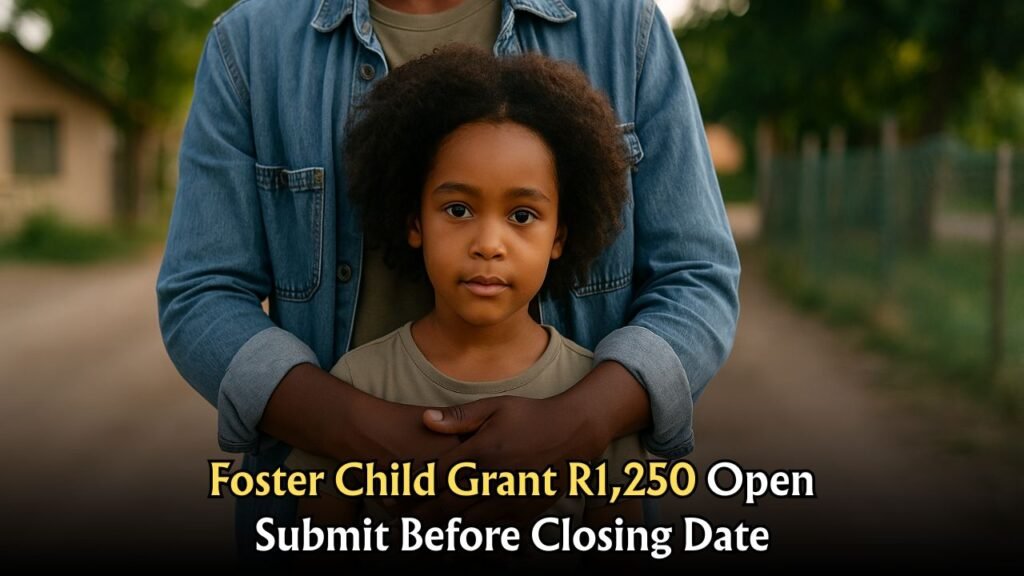New Foster Child Grant in South Africa: The introduction of a new foster child grant in South Africa, valued at R1,250, has sparked widespread excitement across the nation. As families and guardians eagerly prepare to apply, this grant promises to provide much-needed financial assistance to those caring for foster children. The launch of this initiative underscores the government’s commitment to supporting vulnerable children and ensuring they have access to a nurturing environment. With the application process now open, prospective beneficiaries are keen to learn more about the eligibility criteria and how this grant can make a significant difference in their lives.

Understanding the New Foster Child Grant of R1,250
The announcement of the new foster child grant of R1,250 has been met with positive reactions from communities across South Africa. This grant aims to alleviate the financial burden on foster families, ensuring that children in need receive proper care and opportunities for growth. To qualify for this grant, applicants must be legal guardians or foster parents of children under the age of 18. The grant is designed to cover basic needs such as food, clothing, and educational expenses, thereby enhancing the quality of life for these children. By providing this financial support, the government aims to encourage more individuals to become foster parents, thus reducing the number of children living in institutions. Furthermore, this initiative is part of a broader strategy to address social inequality and promote family stability, with the ultimate goal of creating a more inclusive society for all South Africans.
Application Process for the New Foster Child Grant
For those interested in applying for the new foster child grant, understanding the application process is essential. The South African Social Security Agency (SASSA) has streamlined the procedure to ensure accessibility and efficiency. Applicants are required to provide documentation such as the child’s birth certificate, proof of foster care status, and the caregiver’s ID. Additionally, proof of income is necessary to assess financial need. Applications can be submitted online through the SASSA website, or in person at local SASSA offices. It is important for applicants to ensure all documents are complete and authentic to avoid delays. Once submitted, applications are reviewed, and successful applicants will receive monthly payments directly into their bank accounts. With the application window now open, it is advisable for eligible individuals to apply promptly to secure this vital support for their foster children.
Impact of the Foster Child Grant on South African Families
The introduction of the foster child grant is expected to have a profound impact on South African families, particularly those in underserved communities. By providing financial assistance, the grant enables foster parents to meet the essential needs of their children, fostering a stable and loving home environment. This support is crucial in ensuring that foster children have access to education and healthcare, which are pivotal for their development and future success. Moreover, the grant can help alleviate poverty by reducing the financial strain on families who may otherwise struggle to provide for additional children. As more families become empowered to take in foster children, the initiative also addresses the issue of overcrowded orphanages and shelters, providing these children with the chance to grow up in a family setting. This grant not only benefits the children but also strengthens the fabric of society by promoting compassion and community support.
Future Prospects and Challenges of the Foster Child Grant
While the new foster child grant is a promising development, there are future prospects and challenges to consider. The sustainability of the grant relies heavily on the government’s ability to maintain funding amidst economic pressures. Additionally, there is a need for continuous monitoring and evaluation to ensure that the grant reaches those most in need and that the funds are used effectively. Advocacy groups are calling for more comprehensive support systems that include counseling and educational programs for foster children and their families. Addressing these challenges requires collaboration between government agencies, non-profit organizations, and the community at large. As South Africa moves forward with this initiative, it is crucial to build on its successes and address any shortcomings. The ultimate goal is to create a supportive environment where every child has the opportunity to thrive, regardless of their background.




